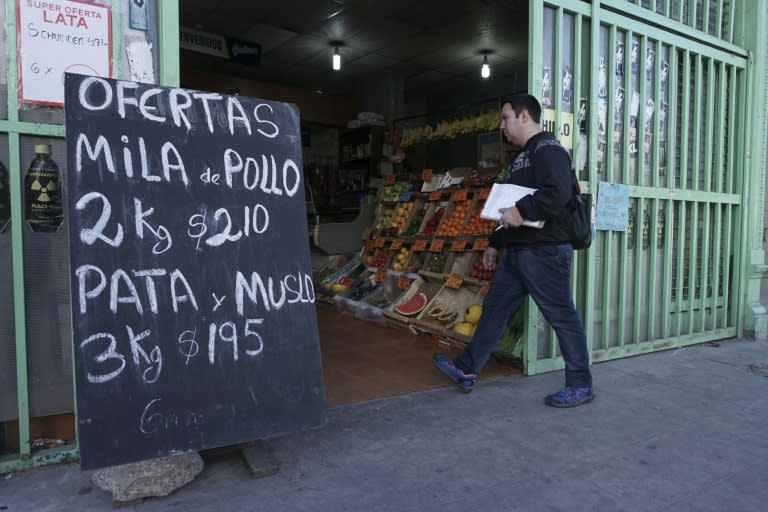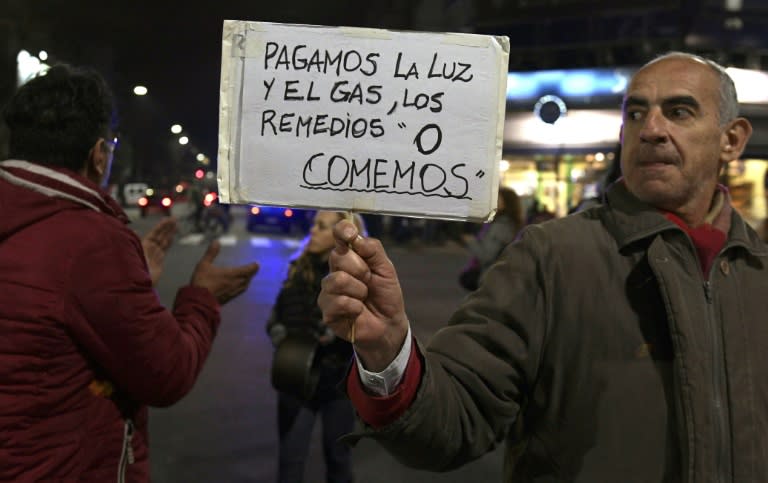Inflation and economic crisis: Argentines have had enough
Every morning, Ezequiel Gonzalez takes a two-hour bus ride from his Buenos Aires suburb to the city hospital where he's in charge of maintenance. And like many Argentines he is feeling first-hand the pinch of government austerity measures. Even working the maximum possible overtime, he earns 20,000 pesos ($500) a month -- which is not enough to afford the "asado" barbecue that traditionally brings Argentine families together on Sundays. "That's just for birthdays. Meat has become too expensive," Gonzalez complains. "Enough! We can't keep living in a state of permanent sacrifice, the price of meat is going up every day." The economy is in a fragile state. The currency has lost more than 50 percent of its value against the dollar since the start of the year, inflation is due to surpass 30 percent by the end of 2018 and interest rates have just been hiked to a world-high 60 percent. In a desperate bid to steady the ship, President Mauricio Macri agreed a $50 billion loan with the International Monetary Fund in June, but the outlook has continued to deteriorate. "The situation worsens every day, I don't know how all this will end," worried Gonzalez. Public ire is directed in equal measure at the center-right government and the IMF, with daily street protests. "IMF Out!" messages adorn many walls while some protesters have taken to banging cooking pots in a pointed reference to them being underused for their main purpose. It's not quite a repeat of the street protests from the economic crisis of 2001, but discontent is widespread. "I'm beside myself. I feel helpless, I'm afraid of being hungry and unable to pay for my medication once I'm retired a year from now," said Garciela Perez, a 64-year-old teacher. - 'Government of the rich' - "People have been waiting two years for things to get better, we're losing patience, it seems like those governing us aren't up to the economic challenges," said 50-year-old Antonio Buffo, a newspaper stall owner. Argentina's economy reacted particularly badly last month to news that Macri had asked the IMF to speed up disbursements of the remaining $35 billion in loans, the next $3 billion of which wasn't due until November. Even new austerity measures announced on Monday, slashing the government's bureaucracy in half and restoring taxes on grain exporters, haven't reversed the gloomy trend. And this in the year Argentina hosts the G20 meetings of the world's largest economies. "This government, they're leaders who govern for the rich," said Edith Zaida, a domestic employee who works nights looking after an elderly lady. The 42-year-old has to support four children aged between five and 14 on the minimum wage of 12,000 pesos a month. She lives in Tigre, 30 kilometers (20 miles) from the capital, and spends at least three hours a day in public transport. She is nostalgic for the leftist government that preceded Macri's -- and which the current leader blames for Argentina's economic woes. "Cristina Kirchner did more to look after the poor. Maybe she stole, but we had something to eat when she was president," added Zaida, referring to Kirchner being investigated for allegedly receiving millions of dollars in bribes. "I'm very worried. Sometimes I cry. I want to leave the country." President from 2007 to 2015, Kirchner could yet make a comeback as Macri's popularity has been in decline. - 'Another crisis' - "Another crisis," sighed Imelda Rodriguez, 43, who works in administration. "Things get harder every day." She voted for Macri in 2015 and hates Kirchner. "I'm disappointed but there isn't a better political alternative. With all the sacrifices they're asking for, I hope that at least there will be some results in the long term." Lirio Tevez, 69, retired three years ago but had to go back to work for a funeral services company as his devalued pension of 12,500 pesos barely covered his 10,000-peso rent. "I have to keep working to be able to live. They've been telling us for years that things will improve but a liter of milk now costs 50 pesos," he said, smiling. "What I fear most... is looting. There were some instances recently and a kid died," he added, referring to the case of a 13-year-old who was killed as he tried to rob a supermarket in Chaco, one of Argentina's poorest regions. "The IMF are governing us," he said. "I've had enough, enough, enough!




